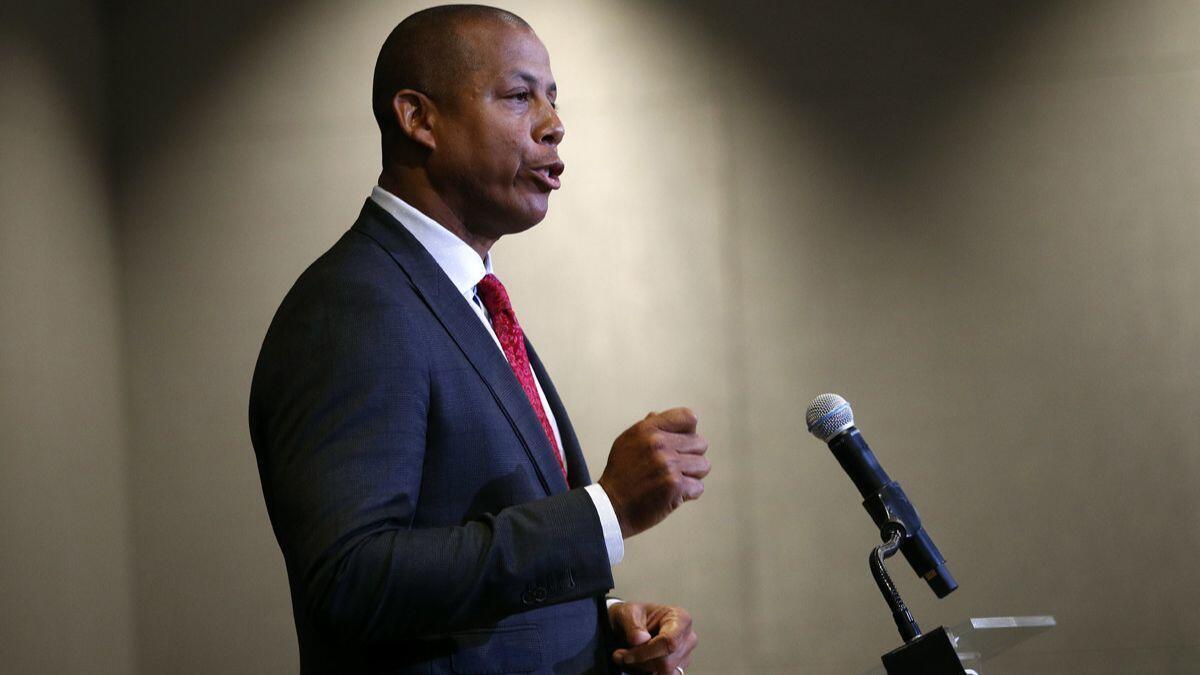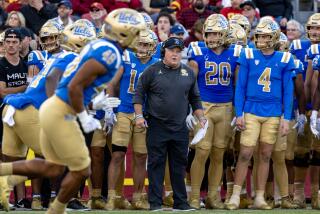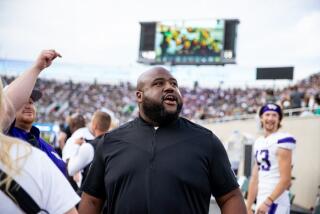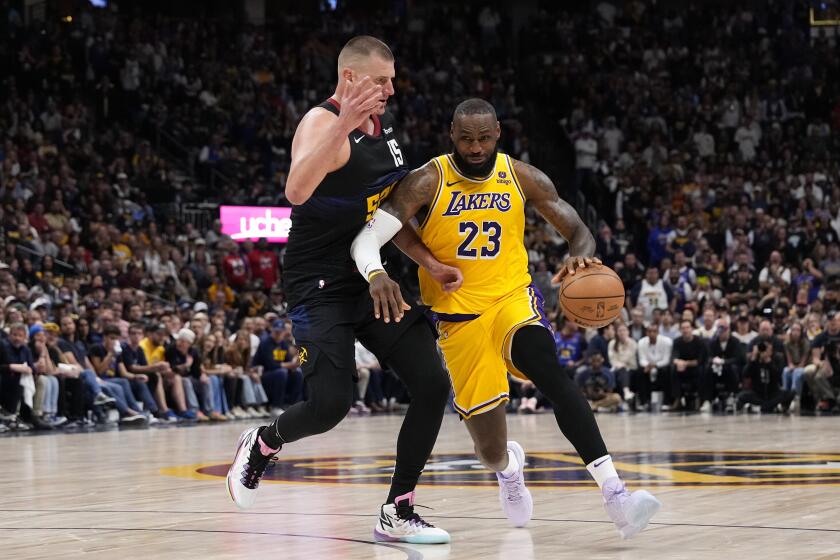Maryland takes step in right direction, but much more is needed from big-time college programs
At least some of the tough questions surrounding a Maryland football player’s recent death are starting to be answered.
In a news conference Tuesday, the university acknowledged that when 19-year-old Jordan McNair collapsed during a springtime workout, athletic trainers failed to diagnose and treat symptoms of his heat-related illness.
Administrators also announced they had parted ways with the team’s strength and conditioning coach while continuing to pursue an intensive review of head coach DJ Durkin and his staff.
“The university accepts legal and moral responsibility,” President Wallace D. Loh said. “Based on what we know at this time, even though the final report is not completed, I said to [McNair’s] family, the university owes you an apology.”
Medical shortcomings are only one concern amid allegations that Durkin fostered an abusive, perhaps dangerous, environment within the program.
“Make no mistake,” athletic director Damon Evans said. “We will not tolerate any behavior … that is detrimental to the mental or physical well-being of our student-athletes.”
Investigators will ultimately decide if Durkin was at fault. In the meantime, the incident has renewed debate over what, exactly, we expect from big-time coaches.
“We talk about balancing values but it’s more about integrating values,” said Shawn E. Klein, who teaches sports ethics at Arizona State. “Winning is one value. So is acting morally.”
Part of what makes the Maryland case so worrisome is a concurrent investigation at Ohio State, where Buckeyes coach Urban Meyer has been placed on administrative leave.

That scenario began with reports of Zach Smith, the receivers coach, facing a history of domestic violence allegations dating back nine years.
The university formed a working group to examine how much Meyer knew — and when he knew — about the accusations against his assistant. The key is: Should he have taken action long before firing Smith in July?
“Please know that the truth is the ultimate power,” Meyer stated. “And I am confident that I took appropriate action.”
While investigators continue their work, the incident has touched a raw nerve, given the awareness raised by the #MeToo movement and the game’s reputation as a macho enclave resistant to change.
The Maryland case is now evoking a similar response. It began on the afternoon of May 29, when McNair collapsed while running multiple 110-yard sprints in 80-degree weather.
According to a timeline issued by the university, he was “having problems recovering” from the workout.There were subsequent media reports — disputed by the school — that he suffered a seizure.
Training staff drove him by cart to the athletic facility, where they should have taken his temperature and administered cold-water immersion treatment, according to Evans. “The emergency response plan was not appropriately followed,” he said.
About an hour passed before paramedics were summoned to take McNair to a nearby hospital, where he reportedly had a temperature of 106 degrees. The 325-pound sophomore was subsequently transferred to a trauma center and died 15 days later.
“Our team is heartbroken,” Durkin said in a June 13 statement. “Jordan was an incredible young man, and his passion and enthusiasm made him an invaluable and beloved member of our team.”
Weeks into the investigation of his death, things took a dramatic turn with an ESPN story that, quoting unnamed sources, alleged Durkin, head athletic trainer Wes Robinson and strength and conditioning coach Rick Court — who resigned this week — operated “on fear and intimidation.”
Players were subjected to verbal abuse and humiliation, the article stated, and in some cases goaded to work until they passed out.
Last weekend, the university placed Durkin, Court, Robinson and another trainer on administrative leave. Officials announced that the initial inquiry would be expanded to assess the atmosphere within the program.
Some players and parents have stepped forward to support Durkin. So has a former colleague, South Carolina coach Will Muschamp.
“He’s an outstanding football coach, but he’s also an outstanding husband and a father, and he treats people with respect,” Muschamp said, adding: “I think it’s a lack of journalistic integrity to print things with anonymous sources.”
Maryland administrators did not dismiss the accusations that quickly.
“These alleged behaviors are not consistent with the values I expect all of our staff to adhere to and we must do better,” Evans said in an open letter. “You will be hearing from me as our work continues to rebuild the culture of respect in our football program.”
While abuse and harassment have no place in sport, there is also no doubt that athletes can benefit from being pushed to perform at a higher level. And football has always walked a fine line.
The image of the gruff, hollering coach is as old as the game itself. A newer school of thought that advocates positive reinforcement is still considered anathema by many.
And the job description might be changing as today’s college players — like others of their generation — grow more sophisticated at a younger age. The idea of a coach as a father figure, ethicist Klein said, has become “a little quaint.”
That change has been accelerated by college football’s transformation into big business, heaping additional pressures on men paid millions each season in the win-or-be-fired world of the Power Five conferences.
“It’s not quite the same as it was in the 1950s — the head coach at a major university is a CEO,” Klein said. “He faces a lot of the same challenges of a CEO who is trying to make a profit while doing things legally.”
Questions surrounding Meyer’s conduct should be resolved soon, with Ohio State expecting a report within days. The Durkin matter, which has ranged into the political arena with the state’s governor and a rival candidate weighing in, could take longer.
Offensive coordinator Matt Canada, who joined the team about six months ago, will oversee the team for now. Maryland administrators said they have already revised policy for teams that practice in the heat, calling for increased breaks and more cooling stations.
McNair’s parents were encouraged after meeting with Loh and Evans on Tuesday morning.
“While Marty and Tonya will never get another day with Jordan, Dr. Loh’s words were meaningful to them and give them some comfort that he will put the university on the path to change the culture of the program so that no Terrapin family will have to endure the heartache and grief that they feel,” their attorney said in a statement.
The full scope of that change won’t be known until a report is issued in mid-September.
No matter what investigators ultimately find, the college game might profit from a debate that stretches even longer.
“You run into these conflicts,” Klein said. “Having the stories come out and having us confront ideas about coaching is better for society and better for athletics.”
Follow @LAtimesWharton on Twitter
More to Read
Get our high school sports newsletter
Prep Rally is devoted to the SoCal high school sports experience, bringing you scores, stories and a behind-the-scenes look at what makes prep sports so popular.
You may occasionally receive promotional content from the Los Angeles Times.







